Contents
Market Overview
Vaccine optimism took most risk markets higher. Pfizer and BioNTech are now expected to submit their vaccine for Emergency Use Authorization to the FDA with an ultimate decision due at the end of this month. Subsequently, the rotation into tech/growth that followed in the aftermath of the U.S. election unwound as value stocks outperformed, which is reflected by a softer S&P and Nasdaq relative to the Dow and Russell. In rates, U.S. Treasuries were wider on the week with 2s10s steepening as 10s30s flattened, unlike most G10 rates which were consistently flattening. Powell called for more fiscal stimulus, while reiterating that the Fed remains on hand for more at the ECB Conference in Sintra, although we can expect further headline noise shortly as Republicans plan a Senate vote on Trump’s Fed Board nominee (Judy Shelton). For EM credit, EM sovereigns were up 1.0% (17bps tighter) after gaining 2.6% in the previous week. Indeed, we continue to see HY outperform IG by some 24bps, with the compression theme very much back in vogue. Outperformers include Iraq, Turkey & Tajikistan, while Zambia, Ethiopia & Lebanon underperformed. Zambia lagged as the four-week grace period associated with the 2024 coupon came to an end. We await clarity on whether the coupon was paid, but Zambia is likely to be the fourth sovereign default in 2020 after Argentina, Lebanon and Ecuador. Elsewhere, we have generally seen CDS trade significantly tighter, with the premium to CDX index NAV unwinding. Cleaner positioning now sees CDS in Turkey below 400bps, South Africa below 230bps, Brazil below 230bps and Russia below 80bps. In effect, the markets are buoyant and ready for primary issuance to recommence, where Russia and Hungary were the first sovereigns out of the gate. Next week will be key for Turkey, with Governor Agbal’s first MPC meeting on Thursday as markets expect to see the one-week repo rate hiked from 10.25%. Similarly, we will have rate decisions from Indonesia, Hungary, Philippines, South Africa and Thailand. Beyond that we are keeping one eye on 3Q GDP prints out of Chile, Colombia and Singapore.
Fixed Income
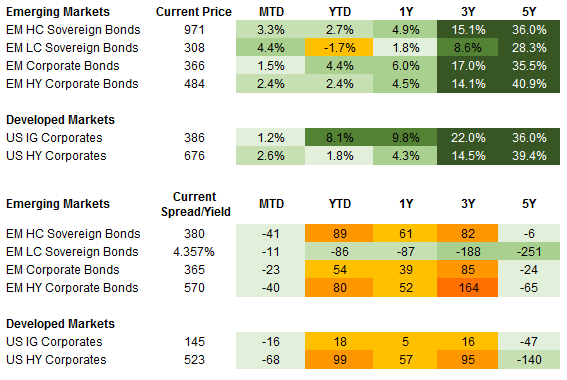
Equities
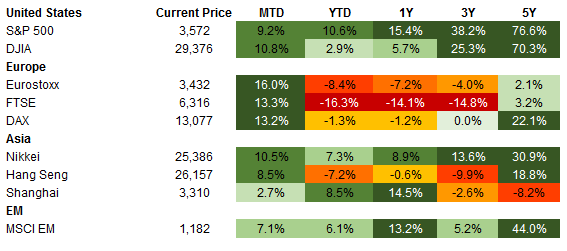
Commodities

Source for data tables: Bloomberg, JPMorgan, Gramercy. EM Fixed Income is represented by the following JPMorgan Indicies: EMBI Global, GBI-EM Global Diversified, CEMBI Broad Diversified and CEMBI Broad High Yield. DM Fixed Income is represented by the JPMorgan JULI Total Return Index and Domestic High Yield Index. Fixed Income, Equity and Commodity data is as of November 13, 2020 (Mid Afternoon).
Emerging Markets Weekly Highlights
Turkey’s government signals a material U-turn in economic policy to the delight of markets, Peru ousts President Martin Vizcarra in impeachment vote, Zambia likely enters into technical default, Pfizer releases preliminary clinical trial results of COVID-19 vaccine showing very high efficacy and Global emerging market corporates in focus: Considering Turkish banks.
Turkey’s government signals a material U-turn in economic policy to the delight of markets
Event: President Erdogan delivered a major shake-up of his economic policy team, dismissing both the Central Bank’s (CBRT) governor, Murat Uysal, and Minister of Finance, Berat Albayrak, who is also his son-in-law. Their replacements, Naci Agbal (a former Minister of Finance) and Lutfi Elvan, respectively, enjoy a reputation of being competent technocrats with good market credentials. Additionally, President Erdogan made a series of statements that appeared to give the green light to the new economic leadership team for a material pivot to a more pragmatic and orthodox economic policy framework.
Gramercy commentary: As we have written in detail on multiple occasions, including last week, the main factor driving Turkish assets’ material underperformance in recent months has been a policy mix characterized by excessively easy monetary and financial conditions and erosion of policy credibility. We have been highlighting a number of policy steps necessary to deliver a “credibility shock” and restore market confidence, most notably significant tightening of monetary policy to anchor inflation expectations and rebuild a positive onshore real rates buffer. The reshuffle at the helm of Turkey’s key economic institutions is being seen by investors as a strong signal that a policy pivot is forthcoming. As a result, Turkish assets rallied across the board this week. Furthermore, President Erdogan’s speech in front of Parliament appeared to endorse a more orthodox approach to economic policy and came as another pleasant surprise to markets. Given the material positive market reaction to this week’s developments, it is critical that the Turkish authorities back up their constructive signaling by tangible policy measures. In that context, CBRT’s upcoming monetary policy meeting on November 19th will be a crucial first opportunity for markets to assess if new governor Agbal has indeed received the political mandate to implement the forceful policy measures needed to stabilize markets and macroeconomic conditions in general. Failure to deliver significant policy tightening next week will reverse the recent gains and plunge Turkish financial markets back into turmoil. However, given the strong signals on an economic policy U-turn by the administration, we believe such a scenario carries a very low probability and we expect a rate hike of at least 500bps on Thursday. Although significant medium-term macroeconomic challenges remain, if a hike of this magnitude materializes, we expect continued sharp improvement in market sentiment for the rest of the year and into 1Q21, supporting an attractive tactical investment opportunity in Turkey’s undervalued assets.
Peru ousts President Martin Vizcarra in impeachment vote
Event: This week, Peru’s Congress unexpectedly voted in favor of removing President Vizcarra on charges of corruption. 105 members of Congress voted for removal with only 19 against, far surpassing the 87 votes necessary to remove Vizcarra from office. Vizcarra agreed to leave peacefully, and, on Tuesday, the former Speaker of Congress, Manuel Merino was sworn in as Peru’s third president in four years. Protests erupted across the country as demonstrators showed their disapproval of the decision.
Gramercy commentary: Vizcarra’s removal from office is a significant blow to Peru’s political stability in the midst of existing challenges like a global pandemic and economic recession. It also increases governability challenges and policy risks ahead of and subsequent to the upcoming election in April 2021. The current consensus is for policy continuity under the newly-inaugurated President Merino, who should remain in office until the next president takes over in July. However, there will likely be a greater preference for continuation of populist policies like the recent pension reforms over swift and pragmatic spending targeted at an inclusive COVID-19 recovery. While Peru’s investment grade credit profile remains intact largely thanks to its solid balance sheet and macroeconomic framework, a reversal of the recent downward trend in dollarization in the context of growing policy uncertainty could increase PEN volatility and erode credit quality overtime.
Zambia likely enters into technical default
Event: The grace period on a $42.5 million coupon payment on the government’s $1 billion 8.5% bond due on October 14th expired on Friday absent an agreement with bondholders on debt service suspension or payment.
Gramercy commentary: We do not expect the government to achieve the support needed for consent solicitation due to limited clarity on the roadmap to an IMF agreement or broader policy agenda, particularly ahead of presidential elections in mid-2021, or restructuring of debts with other major creditors. If all actors were pragmatic with material prospects for eventual agreement on suspension from bondholders with intent to reach a deal pre-election then there would be a strong argument to pay, but the political dynamics do not support this thesis in our view. While the recent failure to pass a bill to prevent any constitutional challenge against current President Edgar Lungu’s candidacy points to an increasingly likely change in leader post-election, the near term implications of intensification of infighting amongst the ruling Patriotic Front (PF) party over his candidacy and replacement will distract from debt resolution and policy management eroding recovery prospects. The selection of the PF’s candidate will likely occur at its General Conference in early 2021. Ultimately, an opposition victory would be most beneficial for IMF relations and bondholders, but the outcome remains highly uncertain amid likely less than fair election conditions.
Pfizer releases preliminary clinical trial results of COVID-19 vaccine showing very high efficacy
Events: On Monday, Pfizer and its German partner, BioNTech, reported their vaccine under development was more than 90% effective in preventing COVID-19. This compares with about 60-70% efficacy for traditional flu vaccines, and a baseline of 50% efficacy required for U.S. Food and Drug Administration approval.
Gramercy commentary: Pfizer’s vaccine news provided a big boost to investor sentiment and risk assets this week, complementing the post-U.S. elections relief rally. With Pfizer’s and other promising vaccines at advanced stages of development, markets will be able to look more confidently through the ongoing material spike in the pandemic during the winter months in the Northern Hemisphere. Once approved for human use, widespread commercial availability of vaccines will be a gradual process and global herd immunity might not be reached before 2022 due to numerous logistical challenges, including skepticism toward vaccination by a significant share of the global population. However, the approval and availability of vaccines will signal the beginning of the end of the pandemic. With some light at the end of the COVID-19 tunnel, markets should reflect a more constructive outlook beyond the difficult near-term, especially if highly effective vaccines, like that being developed by Pfizer, translate into expectations for faster than anticipated recovery in economic activity beyond 1Q21. Growth-sensitive cyclical assets such as emerging markets will be among the major beneficiaries of an improving global economic outlook supported by vaccine availability. As the global economy continues to recover next year amid likely subdued inflation and highly accommodative global policy backdrop, EM assets are likely to attract sizable new inflows by investors searching for yield amid record low/negative rates in DM.
Global emerging market corporates in focus: Considering Turkish banks
Events: Turkey is featured again in this week’s news cycle. The TRY reached historic lows versus the USD and EUR, only to recover dramatically following changes at the Central Bank of Turkey (CBRT) and at the Finance Ministry. Comments from President Erdogan also contributed to the recovery in the currency. At the banks, the results season has continued apace, amidst the headlines. What happens at the CBRT meeting on November 19th will be closely watched.
Gramercy commentary: Regarding the banks’ results, 2020TD operating profitability has been much better than feared at most lenders. Bottom line performance has also been solid – a number of banks have reported above-consensus figures. Even smaller lenders with bonds outstanding have remained profitable – this was not the case in 2018. On liquidity, based on the latest-disclosed foreign currency liquidity coverage ratios, near-term repayments should not be a concern. Regulatory forbearance has helped mask the effects of the COVID-19 pandemic on capital and asset quality. There are factors that may serve as offsets when this forbearance comes to an end. As examples, the state has completed capital injections for the banks owned this year, and has boosted capitalization by acquiring certain insurance interests. The probability of support for these banks remains high. On asset quality, banks are already setting aside additional provisions and may have more time to do so – it may take a while for the full effect of the pandemic to feed through to non-performing loans. Challenges remain, of course – the Halkbank case in the U.S. is yet to be resolved and provisions may remain elevated for some time. In addition, geopolitical tensions never seem far away. Scars from 2018, when bank bond prices fell precipitously, may mean the market is less likely to give these lenders the benefit of the doubt. Notwithstanding this, it is worth noting that time and again, the major banks have proved their resilience by successfully navigating complex challenges. In the last decade, these challenges have included several elections, the ‘taper tantrum,’ loss of investment grade ratings (and multiple downgrades thereafter), an attempted coup, terrorist attacks, myriad changes in regulation, a currency crisis and now, a global pandemic.
Emerging Markets Technicals
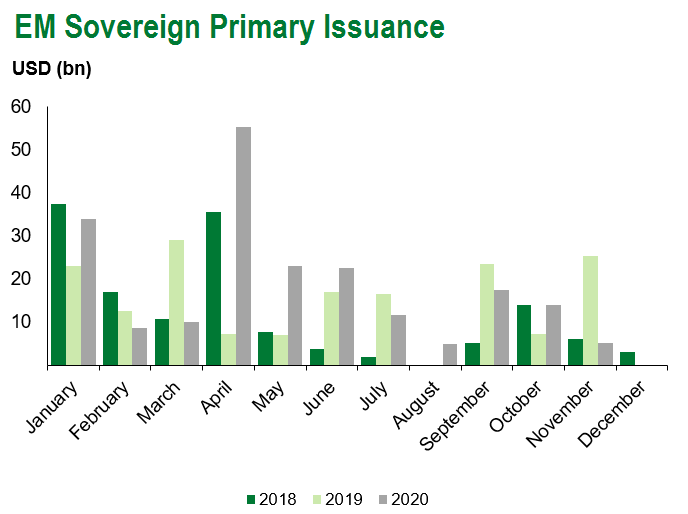
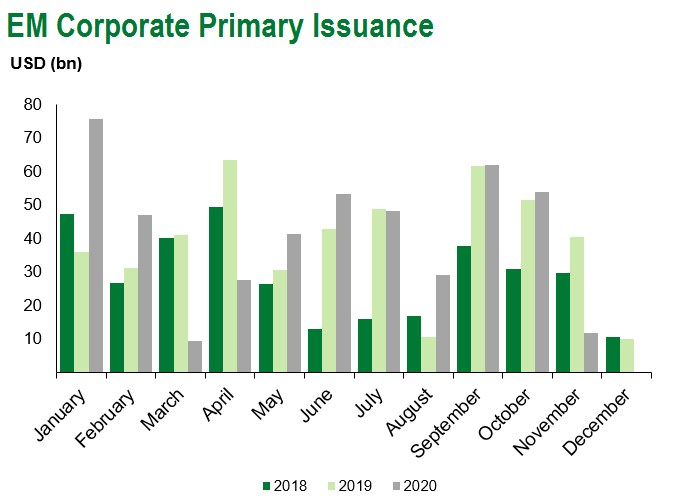
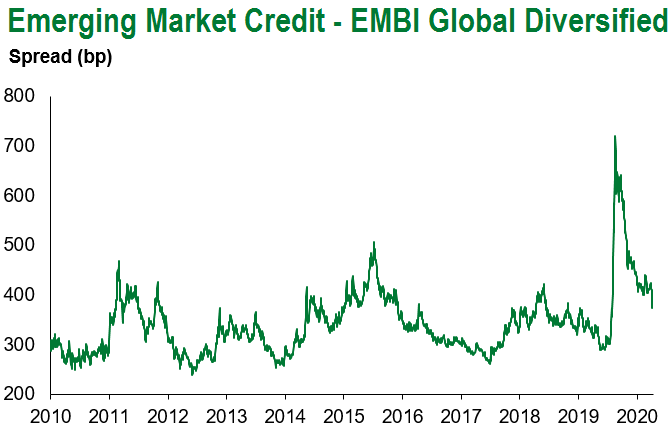
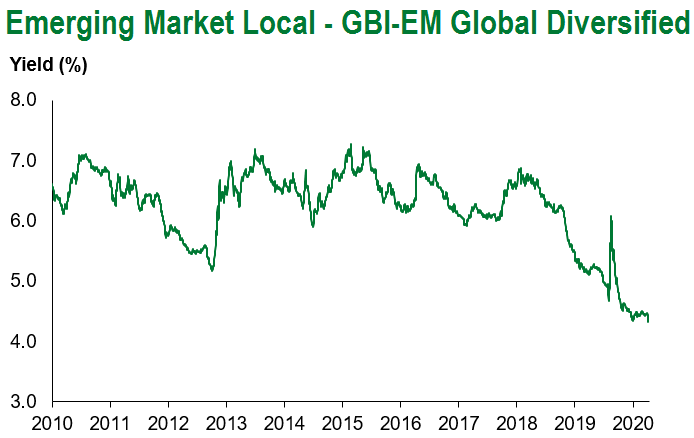
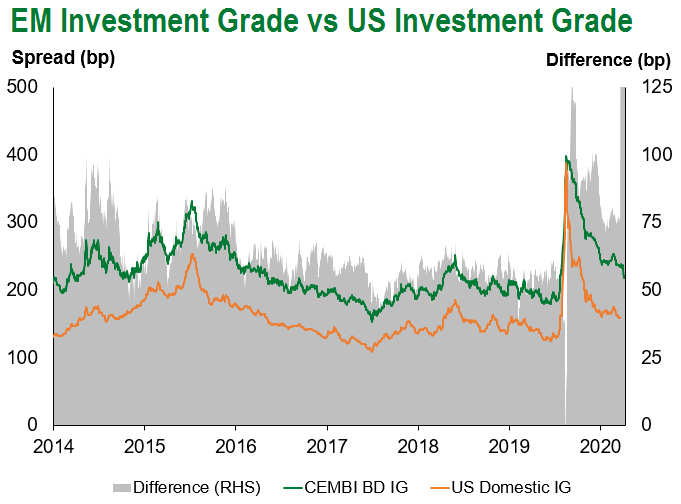
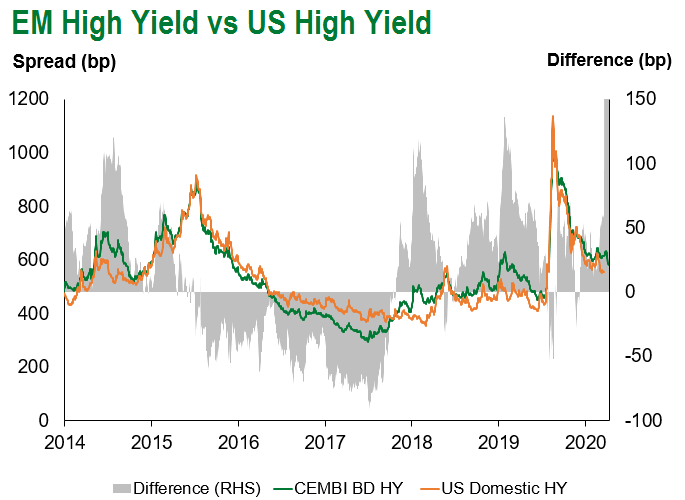
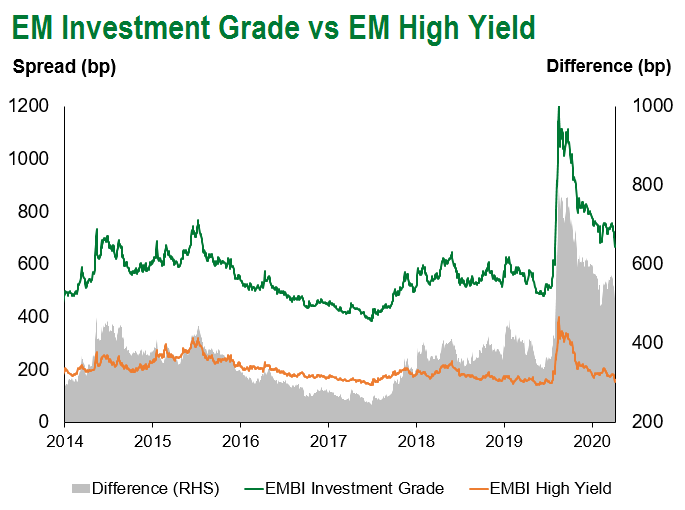
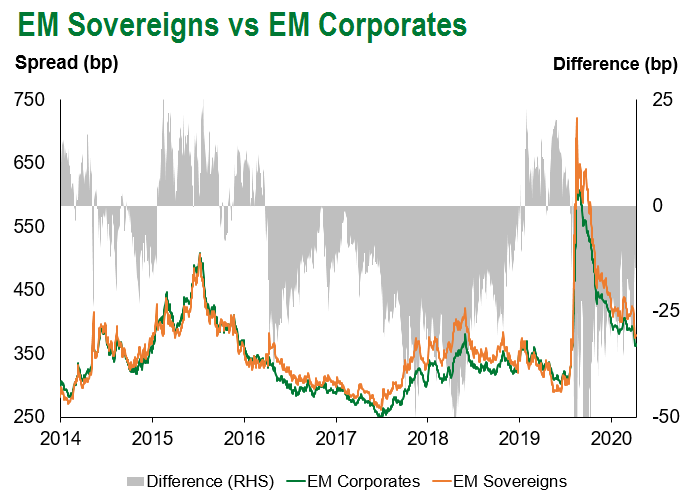
Emerging Markets Flows
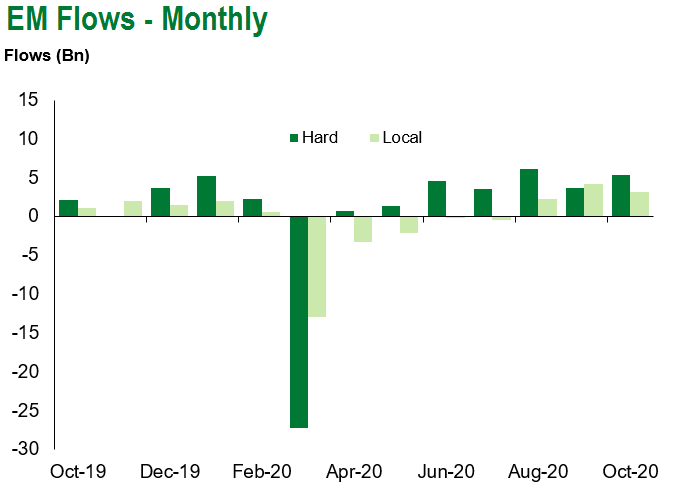
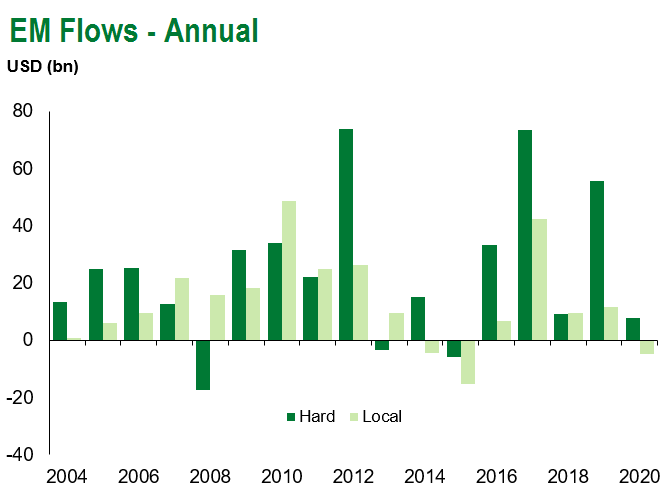
Source for graphs: Bloomberg, JPMorgan, Gramercy. As of November 13, 2020.
COVID Resources
Emerging Markets COVID-19 Case Summary
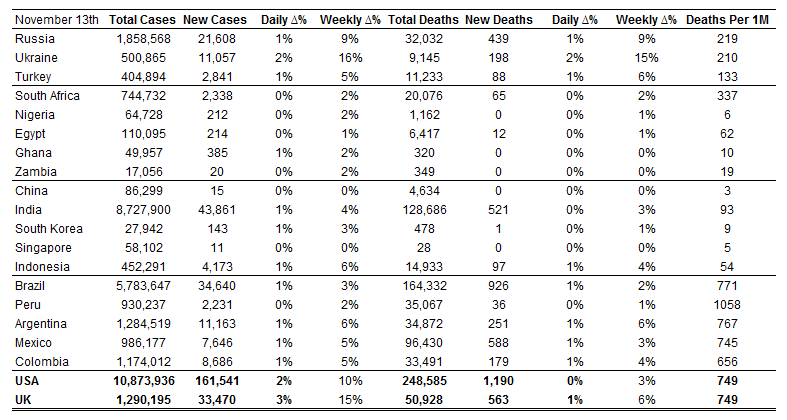
Source: Worldometer as of November 13, 2020.
Additional Crisis Resources:
Johns Hopkins COVID-19 Case Tracker
For questions, please contact:
Kathryn Exum, Senior Vice President, Sovereign Research Analyst, [email protected]
Petar Atanasov, Senior Vice President, Sovereign Research Analyst, [email protected]
Tolu Alamutu, Senior Vice President, Corporate Research Analyst, [email protected]
James Barry, Vice President, Corporate Research Analyst, [email protected]
This document is for informational purposes only. The information presented is not intended to be relied upon as a forecast, research or investment advice, and is not a recommendation, offer or solicitation to buy or sell any securities or to adopt any investment strategy. Gramercy may have current investment positions in the securities or sovereigns mentioned above. The information and opinions contained in this paper are as of the date of initial publication, derived from proprietary and nonproprietary sources deemed by Gramercy to be reliable, are not necessarily all-inclusive and are not guaranteed as to accuracy. This paper may contain “forward-looking” information that is not purely historical in nature. Such information may include, among other things, projections and forecasts. There is no guarantee that any forecasts made will come to pass. Reliance upon information in this paper is at the sole discretion of the reader. You should not rely on this presentation as the basis upon which to make an investment decision. Investment involves risk. There can be no assurance that investment objectives will be achieved. Investors must be prepared to bear the risk of a total loss of their investment. These risks are often heightened for investments in emerging/developing markets or smaller capital markets. International investing involves risks, including risks related to foreign currency, limited liquidity, less government regulation, and the possibility of substantial volatility due to adverse political, economic or other developments. The information provided herein is neither tax nor legal advice. Investors should speak to their tax professional for specific information regarding their tax situation.